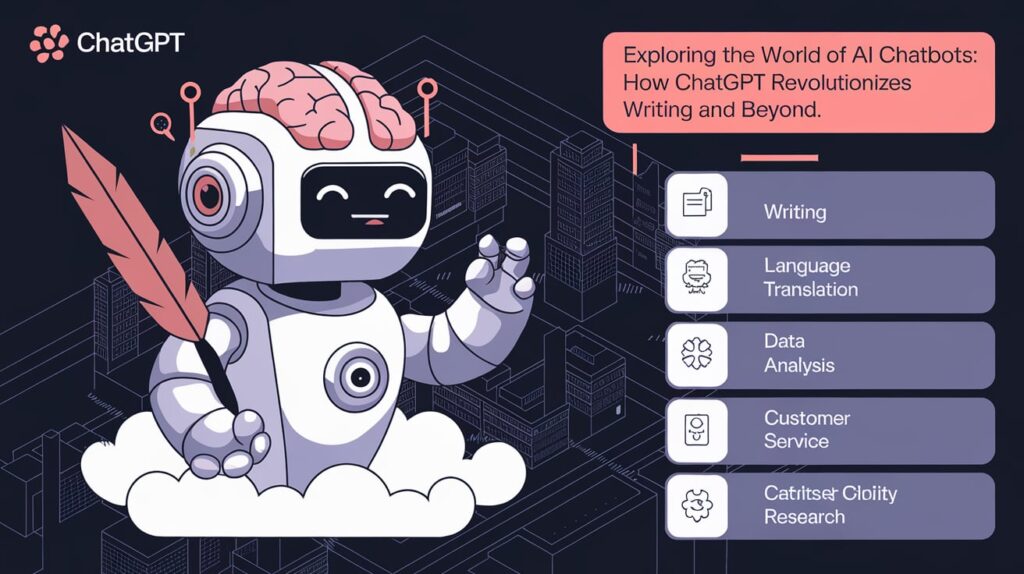
Exploring the World of AI Chatbots: How ChatGPT Revolutionizes Writing and Beyond.
Introduction: A New Era of Digital Communication-
In an age where technology continually transforms the way we interact, communicate, and work, AI chatbots like ChatGPT stand out as groundbreaking innovations. These advanced conversational agents, powered by sophisticated algorithms and vast datasets, are revolutionizing various fields, from customer service to creative writing. This article delves into the world of AI chatbots, focusing on how ChatGPT is reshaping the landscape of writing and more.
Section 1: Understanding AI Chatbots
- What Are AI Chatbots?
AI chatbots are computer programs designed to simulate human conversation. They use natural language processing (NLP) and machine learning to understand and respond to user input in a way that feels natural and intuitive. ChatGPT, developed by OpenAI, is one of the most advanced examples of this technology, capable of generating human-like text based on the context and prompts it receives.
- How ChatGPT Works
ChatGPT operates on the GPT (Generative Pre-trained Transformer) architecture. This model is trained on diverse internet text, allowing it to generate coherent and contextually relevant responses. When a user inputs a prompt, ChatGPT analyzes the text, predicts the most likely continuation, and generates a response that aligns with the input. This process involves complex algorithms and vast amounts of data to ensure the output is engaging and accurate.

Section 2: The Impact of ChatGPT on Writing
- Enhancing Creativity and Productivity
For writers, ChatGPT offers a powerful tool for boosting creativity and productivity. Whether you’re brainstorming ideas, drafting content, or refining your prose, ChatGPT can provide valuable assistance. It can generate content on various topics, suggest improvements, and even help overcome writer’s block by offering fresh perspectives and ideas.
- Personalizing Content Creation
One of ChatGPT’s most remarkable features is its ability to tailor content to specific needs and preferences. By providing detailed prompts and feedback, users can guide ChatGPT to produce text that resonates with their target audience. This personalization is particularly beneficial for businesses and content creators who need to craft engaging, relevant material for diverse platforms.
Section 3: Practical Applications of ChatGPT
- Content Writing and Blogging
In the realm of content writing, ChatGPT is a game-changer. It can generate blog posts, articles, and website content with ease, ensuring high-quality output in less time. For instance, if you’re tasked with writing an 1800-word article, ChatGPT can help structure the content, provide relevant information, and maintain a consistent tone throughout the piece.
- Customer Support and Engagement
AI chatbots are also transforming customer support by providing instant, accurate responses to inquiries. ChatGPT can handle a wide range of customer service tasks, from answering frequently asked questions to resolving complex issues. This efficiency enhances customer satisfaction and reduces the workload for support teams.
Section 4: The Human Touch in AI Writing
- Balancing Automation and Authenticity
While ChatGPT excels at generating text, maintaining a human touch in writing remains essential. This balance is achieved by combining AI’s efficiency with human creativity and empathy. Writers can use ChatGPT as a tool to enhance their work, but the final output should always be reviewed and refined to ensure it resonates with readers on a personal level.
- Ensuring Originality and Avoiding Plagiarism
Originality is a key concern when using AI tools for writing. ChatGPT generates text based on patterns learned from existing data, but it’s crucial to ensure that the content produced is unique and free from plagiarism. Writers should verify the output and make necessary adjustments to maintain authenticity and originality.

Section 5: The Future of AI Chatbots and Writing
- Advancements in Technology
As AI technology continues to evolve, we can expect even more sophisticated chatbots with enhanced capabilities. Future advancements may include improved contextual understanding, better personalization, and more nuanced conversational skills. These developments will further expand the possibilities for AI in writing and other fields.
- Ethical Considerations and Challenges
With the rise of AI chatbots, ethical considerations become increasingly important. Issues such as data privacy, bias, and the potential for misuse must be addressed to ensure that AI technologies are used responsibly. Ongoing research and regulation will play a crucial role in navigating these challenges and ensuring the ethical use of AI.
Conclusion: Embracing the Future of AI
ChatGPT and similar AI chatbots are revolutionizing the way we write, communicate, and interact with technology. By enhancing creativity, productivity, and personalization, these tools offer exciting opportunities for individuals and businesses alike. As we continue to explore the potential of AI, it’s essential to strike a balance between automation and human touch, ensuring that technology serves to enrich our lives while maintaining authenticity and originality.
As we look to the future, the integration of AI chatbots into various aspects of our lives promises to bring about even more transformative changes. Embracing these advancements with an open mind and a commitment to ethical practices will be key to unlocking the full potential of AI and ensuring a positive impact on our world.